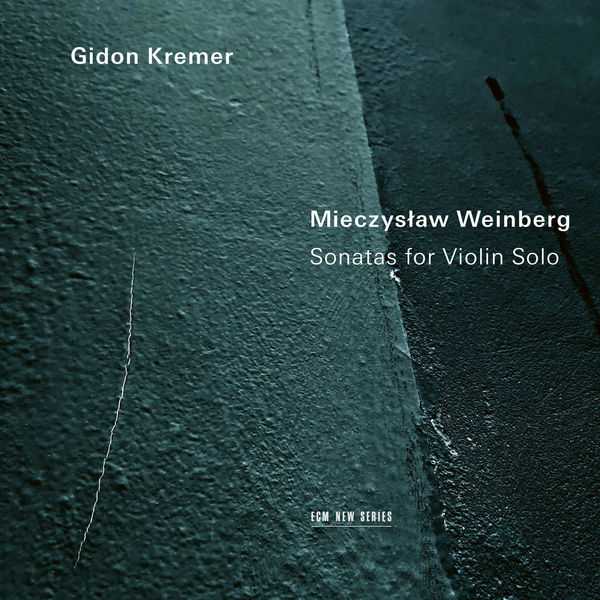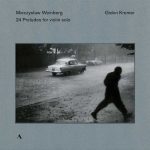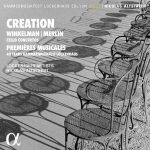

Composer: Mieczyslaw Weinberg
Performer: Gidon Kremer
Format: FLAC (tracks)
Label: ECM
Catalogue: 4856943
Release: 2022
Size: 1.14 GB
Recovery: +3%
Scan: yes
01. Sonata No. 3, Op. 126
Sonata No. 2, Op. 95
02. I. Monody
03. II. Rests
04. III. Intervals
05. IV. Replies
06. V. Accompaniment
07. VI. Invocation
08. VII. Syncopes
Sonata No. 1, Op. 82
09. I. Adagio-Allegro
10. II. Andante
11. III. Allegretto
12. IV. Lento
13. V. Presto
The three sonatas of Polish composer Mieczyslaw Weinberg, written in 1964, 1967 and 1979, are among the most richly creative and technically challenging 20th century works for solo violin, and their radical expressivity draws the listener in. Gidon Kremer, a key figure in the revival of interest in Weinberg’s music, ranks these pieces with the Bartk sonata for their challenges and rewards.
As he has said, “I am very pleased that the world is slowly recognising Mieczyslaw Weinberg as an important composer. For me personally, the treasure trove of his compositions remains a constant source of enthusiasm and inspiration.” Recorded at the Lockenhaus Chamber Music festival and at Studio Residence Palesius, Lithuania, this edition of the Weinberg violin sonatas is issued on the occasion of Kremer’s 75th birthday.
Latvian violinist Gidon Kremer’s repertoire is so very wide and varied, and his collaborations so very generous, creative and non-standard – not least thanks to his championing of contemporary Russian and Eastern European composers – that there will have been any number of attention-grabbing programmes up his sleeve that would have done the job of marking his 75th birthday in the recording studio.
However his decision to go simply for the three solo violin sonatas of Polish-Jewish composer Mieczysław Weinberg (1919-1996) feels pretty perfect. Most importantly, Kremer has been a key figure in the recent revival of interest in this Moscow-based friend of Shostakovich who found himself and his music repeatedly side-lined by the Soviet authorities, spearheading major projects such as the 2020 Gramophone Award-winning collaboration for Deutsche Grammophon between his own Kremeratica Baltica and the City of Birmingham Symphony Orchestra under Mirga Gražinytė-Tyla, for Weinberg’s Symphonies No. 2 and No. 21. Also though, there’s something rather emotionally resonant simply about the act of presenting under-recorded repertoire completely solo, given that this Moscow-trained former pupil of David Oistrakh put his own earlier career at risk through his determination to champion composers the Soviet authorities disapproved of, such as Schnittke and Pärt.
Back, though, to Weinberg’s Solo Violin Sonatas. Written in 1964, 1967 and 1979, these are radical, deeply expressive, immensely technically demanding works, in the spirit of Bach while containing whispers of folk and Jewish music, that Kremer himself ranks alongside Bartók’s Solo Sonata for their challenges and rewards; and the readings we have here – vividly captured at Kremer’s own Lockenhaus Chamber Music Festival and at Studio Residence Palesius, Lithuania – exude intimate knowledge of both the notes on the score, and the cultural background behind them.
The defiant First Sonata dazzles the ear for its compelling human voice as much for its dizzying virtuosity, Kremer spicing his silky technical perfection with fabulous rough-edged texture. Likewise, the Second Sonata’s succession of almost character pieces feel imbued with subtext, as Kremer offers up a huge sweep of tonal and emotional colour. Take the delicately voiced Accompaniment (No. 5) with its conversation between the violin’s wispily delicate upper registers and its darker, broader lower reaches, arco and pizzicato playing off each other to brilliant effect; then the wide, defiant, elegiac long lines of the ensuing Invocation.
These surely shoot to the top of the pile as the obvious go-to recording for these powerful works.



